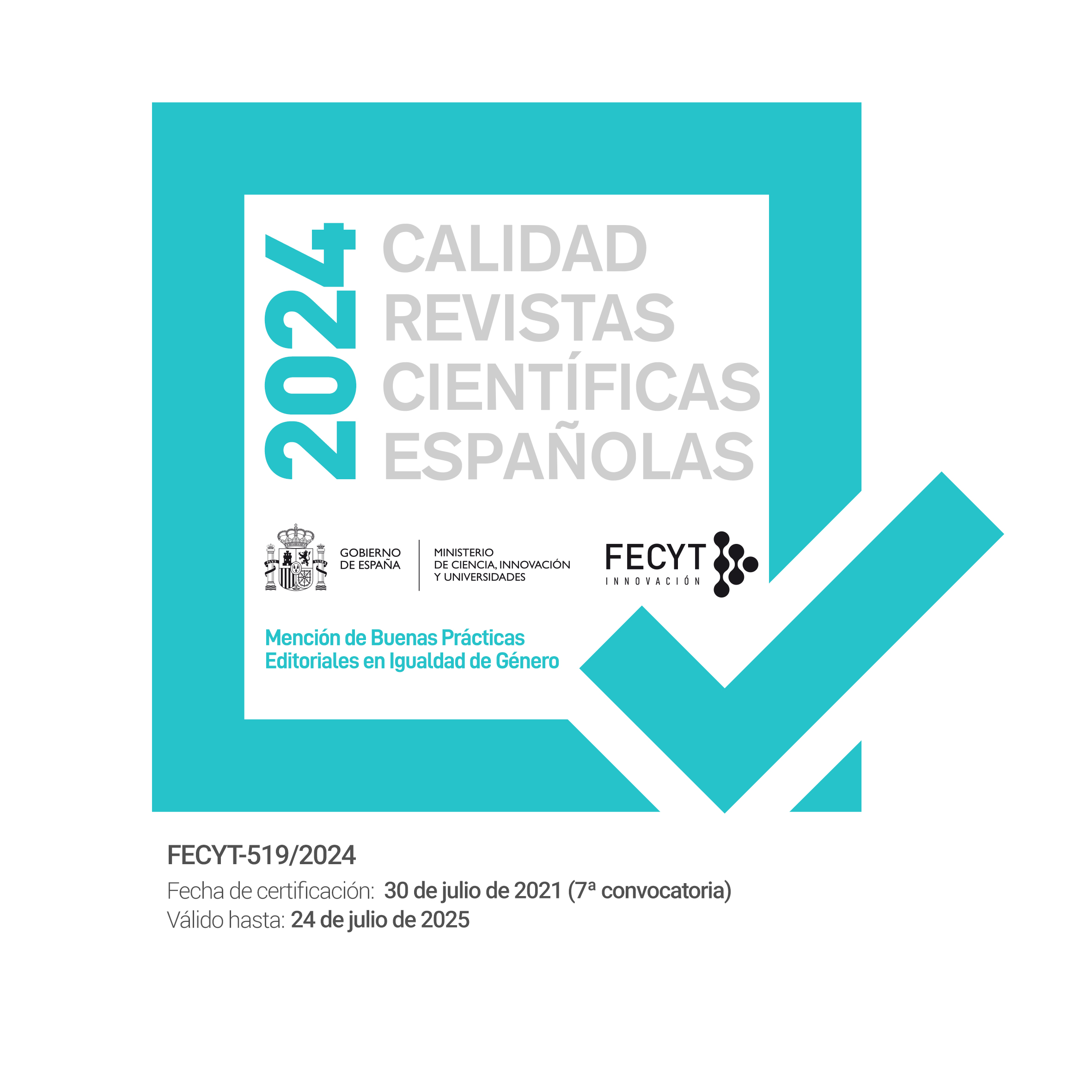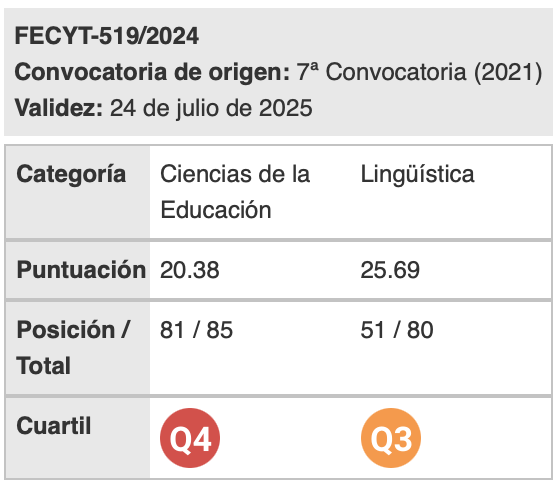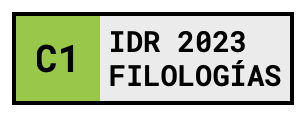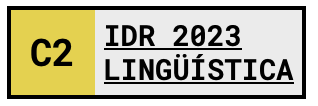¿Cuán gramaticalmente complejos son los títulos de los artículos científicos en las ciencias naturales?
Palabras clave:
Titles, research papers, natural sciences, English, , grammar, morphosyntax, compound words, lexical densityResumen
This paper examines a corpus of 150 titles of research articles published between 2010 and 2013 in Anglo-American natural sciences journals (physics, chemistry and biology) in order to determine their lexical density and grammatical and morphosyntactic features. Towards that end, the frequency of present and past participles, prepositions, coordinating and subordinate conjunctions, and the frequency and length of compound words was recorded in each title. The total number of content and function words was also recorded so as to determine title lexical density. ANOVA tests were applied in order to assess whether statistically significant differences in the frequency of the above mentioned variables were detected within and across disciplines and in the whole corpus. Our results showed that, in the three disciplines, the frequency of the past participle is higher than that of the present participle (p = 0,04). They also disclosed that prepositions are the most frequently used function words and that they outnumber coordinating conjunctions (p = 0,02). Compound words were found to be very frequent, especially 2- and 3-word ones. As for title lexical density, it was found to be similar across disciplines (3,1). The only statistically significant cross-disciplinary difference detected was that present participles are more frequently used in chemistry than in biology (p= 0,001). Our findings reflect the complexity of the scientific concepts expressed in natural sciences research article titles. Because titles are frequently the only section of a paper scientists read so as to decide whether to read on or not, we present a few pedagogical tips that could be applied in reading and/or writing ESP courses.
DOI: 10.20420/rlfe.2015.0012
Descargas
Citas
Afful, J. y Mwinlaaru, I. (2010). Commonality and individuality in academic writing: An analysis of conference paper titles of four scholars. ESP World, 1(27). <http://www.esp-world.info> [25/06/2013]
Akirov, A., y Salager-Meyer, F. (1985). Difficulty analysis and reading comprehension: an experimental study with Venezuelan science students. English for Specific Purposes, 94, 6-12.
Alcaraz-Ariza, M. y Salager-Meyer, F. (2012). Análisis contrastivo de los títulos en los artículos de investigación de neurología redactado en español e inglés. Language for Special Purposes, Professional Communication, Knowledge Management and Cognition, 3(2), 27-50.
Anthony, L. (2001). Characteristic features of research article titles in computer science. IEEE Transactions on Professional Communication, 44(3), 187-194.
Banks, D. (2005). The case of Perrin and Thompson: An example of the use of a mini corpus. English for Specific Purposes, 24(2), 201-213.
Barbic, S., K. Roberts, Z., Durisko, C., Lee; Yachouh, R. y McKenzie, K. (2015). Readability assessment of psychiatry journal. European Science Editing, 41(1), 3-11.
Belcher, D. (2005). Editorial. English for Specific Purposes, 14, 119-121.
Belcher, D. (2009). English for Specific Purposes in theory and practice. Ann Arbor, MI: University of Michigan Press.
Biacchi, A. (2003) Relation complexity of titles and texts: A semiotic taxonomy. En L. Merlini Barbaresi (Ed.), Complexity in language and text (pp. 319-341). Pisa: PLUS.
Biber, D. y Gray, B. (2010). Challenging stereotypes about academic writing: Complexity elaboration, explicitness. Journal of English for Academic Purposes, 9(1), 2-20.
Budgell, B.S. (2013). The language of integrative medicine. Journal of Integrative Medicine. 11(3), 229-232.
Busch-Lauer, I. (2000). Titles of English and German research papers in medicine and linguistics theses and research articles. En A. Trosborg (Eds.), Analysing professional genres (pp. 77-94). Amsterdam/Philadelphia: John Benjamins.
Buxton, A., y Meadows, A. (1977). The variation in the information content of titles of research papers with time and discipline. Journal of Documentation, 33(1), 46-52.
Cheng, S., Chih-Wei, K. y Chih-Hua, K. (2012). Research article titles in applied linguistics. Journal of Academic Language & Learning, 6(1), A1-14.
Day, R. (1998). How to write and publish a scientific paper. Cambridge: Cambridge University Press.
Dillon, J. (1982). In pursuit of the colon: A century of scholarly progress: 1880–1980. The Journal of Higher Education, 53(1), 93-99.
Diodato, V. y Pearson, K. (1985). Source indexing in science journals and indexing services: a survey of current practices. Science and Technology Libraries 6, 103-118.
Entralgo, J., Salager-Meyer, F. y Luzardo Briceño, M. (2015). Títulos de artículos de investigación escritos en inglés: un estudio interdisciplinario, Núcleo. En prensa.
Fortanet, I., Coll J., Palmer J. y Posteguillo S. (1997). The writing of titles in academic research articles. En R. M. Chamorro y A. R. Navarrete (Eds.), Lenguas aplicadas a las ciencias y la tecnología (pp. 155-158). Cáceres, España: Servicio de Publicaciones de la Universidad de Extremadura.
Flowerdew, L. (2005). An integration of corpus-based and genre-based approach to text analysis in EAP/ESP: Countering criticisms against corpus-based methodologies. English for Specific Purposes, 25(3), 321-332.
Gesuato, S. (2009). Encoding of information in titles: Practices across four genres in linguistics‟. En C. Taylor (Eds.), The role of e-corpora in translation and language learning (pp. 127-157). Ecolingua.
Goodman, N. (2000). Survey of active verbs in the titles of clinical trials reports. British Medical Journal, 320, 914-915.
Goodman, R., Thacker, S.B. y Siegel, P. (2001). What’s in a title? A descriptive study of article titles in peer-reviewed medical journals. Science Editor, 24(3), 75-78.
Haggan, M. (2004). Research paper titles in literature, linguistics and science: Dimensions of attraction. Journal of Pragmatics, 36, 293-317.
Haynes, R., McKibbon, K., Walker, C., Ryan, N. Fitzgerald, D., y Ramsden, M. (1990). On the medical narrative from a diachronic perspective online access to MEDLINE in clinical settings. A study of use and usefulness. Annals of Internal Medicine, 112, 78-84.
Hartley, J. (2008). Academic writing and publishing: A practical handbook. Abingdon: Routlege.
Hodges, P. R. (1983). Keyword in title indexes: effectiveness in retrieval in computer searchers. Special Libraries, 74, 56-60.
Hyland, K., and F. Salager-Meyer (2008) Scientific writing. ARIST (Annual Review of Information Science and Technology), 297-339.
Larsen, P.O., y M. von Ins (2010). The rate of growth in scientific publication and the decline in coverage provided by Science Citation Index. Scientometrics, 84(3), 575-603.
Lewinson, G. y Hartley J. (2005) What’s in a title? Number of words and the presence of colons. Scientometrics, 63(2): 341-356.
Moore, A. (2010). Do article titles attributes influence ciations? Exchanges <http://exchanges.wiley.com/blog/category/research/> [20/01/2013].
Nesi, H. (2013). ESP and corpus studies. En B. Paltridge y S. Starfield (Eds.), The handbook of English for specific purposes (pp. 408-424). London: Wiley-Blackwell.
Salager-Meyer, F. (1984). Compound nominal phrases in scientific technical writings: proportion and rationale. En A. Pugh y J. Ulijn (Eds.), Reading in a Foreign Language: Studies in native and foreign languages (pp. 136-146). London: Heinemann.
Salager-Meyer, F. (1992). A text-type and move analysis study of verb tense and modality distribution in medical English abstracts. English for Specific Purposes, 11(2), 93-115.
Salager-Meyer, F. (2004). Reading medical English: A textbook for medical doctors, students and researchers. Mérida, Venezuela: Consejo de publicaciones de la Universidad de los Andes.
Salager-Meyer, F., Alcaraz-Ariza, M. A. y Luzardo Briceño, M. (2013). Medical case reports and titleology: A diachronic perspective (1840-2009). Revista de lenguas para fines específicos, 19, 397-413.
Sapir, E. (1971). Language. London: Rupert Hart-Davis.
Saussure, F. (1974). Curso de lingüística general. Buenos Aires: Losada.
Soler, M. V. (2007). Writing titles in science: An exploratory study. English for Specific Purposes, 26, 90-102.
Soler, M. V. (2011). Comparative and contrastive observations on scientific titles written in English and Spanish. English for Specific Purposes, 30,124-137.
Stix, G. (1994). The spread of write. Trends on scientific communication. Scientific American, 271, 106-111.
Swales, J. (2004). Research genres. Exploration and application. Cambridge: Cambridge University Press.
Wang, Y. y Bai, Y. (2007). A corpus-based syntactic study of medical research article titles. System, 35, 38–399.
West, M.P. (1053). A general word list of English words with semantic frequencies and a supplementary word-list for the writing of popular science and technology. Longman: Longmans Green.
Whissell, C. (1999). Linguistic complexity of abstracts and titles in highly cited journals. Perceptual and Motor Skills, 88, 76-86.
Yitzhaki, M. (1994). Relation of title length of journal articles to number of authors. Scientometrics, 30, 321-332.
Zeiger, M. (2000). Essentials of writing biomedical research papers. NY: McGraw-Hill.
Descargas
Publicado
Cómo citar
Número
Sección
Licencia
Aquellos autores/as que tengan publicaciones con esta revista, aceptan los términos siguientes:
- Los autores/as conservarán sus derechos de autor y garantizarán a la revista el derecho de primera publicación de su obra, el cuál estará simultáneamente sujeto a la Licencia de reconocimiento de Creative Commons que permite a terceros compartir la obra siempre que se indique su autor y su primera publicación esta revista.
- Los autores/as podrán adoptar otros acuerdos de licencia no exclusiva de distribución de la versión de la obra publicada (p. ej.: depositarla en un archivo telemático institucional o publicarla en un volumen monográfico) siempre que se indique la publicación inicial en esta revista.
- Se permite y recomienda a los autores/as difundir su obra a través de Internet (p. ej.: en archivos telemáticos institucionales o en su página web) antes y durante el proceso de envío, lo cual puede producir intercambios interesantes y aumentar las citas de la obra publicada. (Véase El efecto del acceso abierto).

Revista de Lenguas para fines específicos is licensed under a Creative Commons Reconocimiento-NoComercial-SinObraDerivada 4.0 Internacional License.






















